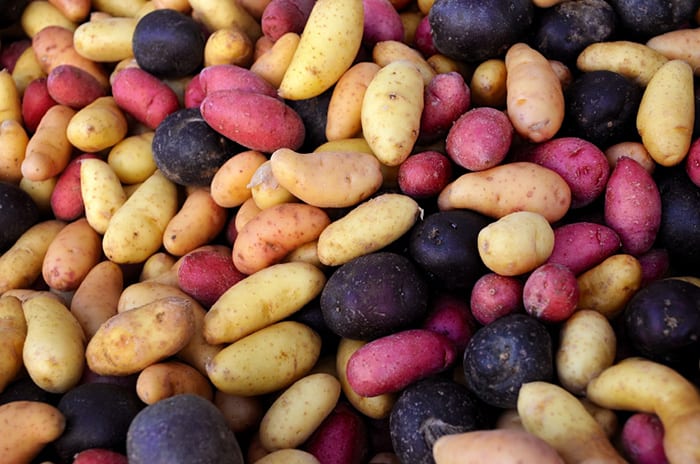
Myths about foods people with diabetes should eat or not eat are numerous. Potatoes are one of these foods that have gotten a very bad rap — and because potatoes are known to be a “starchy” vegetable, and break down into sugar, many misinformed people believe that they should be completely avoided in those with diabetes. This couldn’t be further from the truth!
Facts about the Potato
- Potatoes are fat-free, cholesterol-free, high in vitamin C, high in potassium, and a good source of vitamin B6 and dietary fiber
- An average 5.3-ounce potato with the skin contains 45 percent of the daily value for vitamin C, 620 milligrams of potassium (comparable to bananas, spinach and broccoli), and trace amounts of thiamin, riboflavin, folate, magnesium, phosphorous, iron and zinc. This nutrient powerhouse contains only 110 calories, no fat or cholesterol, 16 milligrams of sodium, 24 grams of carbohydrate, 2 grams of fiber and 3 grams of protein.
- A half-cup serving of potatoes is considered one carbohydrate choice (15 grams) in the diabetes meal-planning world. Think of a “computer-mouse” as one-serving size of a whole baked potato (about a quarter of a large potato).
Facts about the Sweet Potato
- Sweet potatoes are rich in beta-carotene (a form of vitamin A). The body converts the beta-carotene in one serving of sweet potatoes to more than twice the daily requirement of vitamin A. Beta-carotene is a powerful cancer fighter that also reduces blood cholesterol. In plants, beta-carotene serves to protect leaves and stems from the ravages of sunlight and other environmental threats. In humans, these same compounds help block cancer formation, and also protect against arthritis and other degenerative diseases. In addition, sweet potatoes provide nearly as much vitamin E as do fatty nuts and seeds, and provide a nice dose of vitamin C and iron.
- An average 5.3-ounce baked sweet potato with the skin contains 135 calories, no fat or cholesterol, 54 milligrams of sodium, 5 grams of fiber and 3 grams of protein.
- A half-cup serving of sweet potatoes is considered one carbohydrate choice (15 grams) in the diabetes meal-planning world.
- With these amazing nutrient contents, do regular potatoes and sweet potatoes sound like foods that should be avoided by people with diabetes…or anyone else, for that matter? Absolutely not!
Potatoes are nutrient powerhouses. They are complex carbohydrates that provide a sustained source of energy, which people with diabetes require just like everyone else. However, what should be avoided in people with diabetes — or in people who want to avoid becoming overweight or obese or developing diabetes — is excess amounts and excess ingredients added to the potatoes.
Potatoes only become unhealthy when they are eaten in too large of a quantity, are fried, or are bathed in other unhealthy foods like margarine, butter, cream, marshmallows or cheese.
Potatoes can easily fit into a diabetes meal plan, but the amount depends on your individual carbohydrate allowance. It’s very important that you consult with your healthcare provider and your registered dietitian to determine just what your individual carbohydrate requirements are at each meal or snack. Generally, a good rule of thumb is no more than 15 to 30 grams of a carbohydrate source at a snack, 30 to 45 grams at a meal for women and 45 to 60 grams at a meal for men. But these are only estimates. Your needs will vary. So, even though one carbohydrate choice of a potato is ½ cup, based on your individual needs, you may be able to consume up to 1 cup to 1 ½ cups of potatoes at a meal.
Like all foods eaten by people with diabetes, it’s important to see how individually you react to different foods and meals. It is desired that people with diabetes test their blood glucose with a glucometer several times a day. Two hours after a meal, it is desired that the blood glucose be less than 140 mg/dL. If it is greater than this, you should contact your healthcare provider and/or registered dietitian, to find out how you can get better glucose control through improved meal planning, increased activity, and/or adjustments in your diabetes medications.
